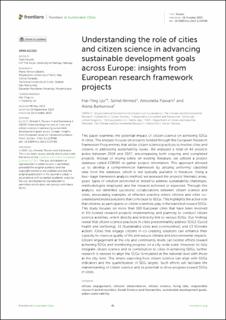| dc.contributor.author | Liu, Hai Ying | |
| dc.contributor.author | Ahmed, Sohel | |
| dc.contributor.author | Passani, Antonella | |
| dc.contributor.author | Bartonova, Alena | |
| dc.date.accessioned | 2023-11-01T09:58:42Z | |
| dc.date.available | 2023-11-01T09:58:42Z | |
| dc.date.created | 2023-10-18T09:03:32Z | |
| dc.date.issued | 2023 | |
| dc.identifier.citation | Frontiers in Sustainable Cities. 2023, 5, 1219768. | en_US |
| dc.identifier.uri | https://hdl.handle.net/11250/3099930 | |
| dc.description.abstract | This paper examines the potential impact of citizen science on achieving SDGs in cities. The analysis focuses on projects funded through the European Research Framework Programmes that utilize citizen science practices to involve cities and citizens in addressing sustainability issues. We analyzed a total of 44 projects active between 2016 and 2027, encompassing both ongoing and completed projects. Instead of relying solely on existing literature, we utilized a project database called CORDIS to gather project information. This approach allowed us to develop a comprehensive framework by utilizing uniformly classified data from the database, which is not typically available in literature. Using a four-stage framework analysis method, we assessed the projects' thematic areas, goals, types of solution promoted or tested to address sustainability challenges, methodologies employed, and the impacts achieved or expected. Through this analysis, we identified successful collaborations between citizen science and cities, showcasing examples of effective practice where citizens and cities co-created and tested solutions that contribute to SDGs. This highlights the active role that citizens, as participants or citizen scientists, play in the transition toward SDGs. This study focuses on more than 100 European cities that have been involved in EU-funded research projects implementing and planning to conduct citizen science activities, which directly and indirectly link to various SDGs. Our findings reveal that citizen science practices in cities predominantly address SDG3 (Good health and wellbeing), 11 (Sustainable cities and communities), and 13 (Climate action). Cities that engage citizens in co-creating solutions can enhance their capacity to improve quality of life and reduce climate and environmental impacts. Citizen engagement at the city and community levels can bolster efforts toward achieving SDGs and monitoring progress on a city-wide scale. However, to fully integrate citizen science and its contribution to cities in achieving SDGs, further research is needed to align the SDGs formulated at the national level with those at the city level. This entails exploring how citizen science can align with SDGs indicators and the quantification of SDG targets. Such efforts will facilitate the mainstreaming of citizen science and its potential to drive progress toward SDGs in cities. | en_US |
| dc.language.iso | eng | en_US |
| dc.rights | Navngivelse 4.0 Internasjonal | * |
| dc.rights.uri | http://creativecommons.org/licenses/by/4.0/deed.no | * |
| dc.title | Understanding the role of cities and citizen science in advancing sustainable development goals across Europe: insights from European research framework projects | en_US |
| dc.title.alternative | Understanding the role of cities and citizen science in advancing sustainable development goals across Europe: insights from European research framework projects | en_US |
| dc.type | Peer reviewed | en_US |
| dc.type | Journal article | en_US |
| dc.description.version | publishedVersion | en_US |
| dc.rights.holder | © 2023 Liu, Ahmed, Passani and Bartonova. | en_US |
| dc.source.volume | 5 | en_US |
| dc.source.journal | Frontiers in Sustainable Cities | en_US |
| dc.identifier.doi | 10.3389/frsc.2023.1219768 | |
| dc.identifier.cristin | 2185768 | |
| dc.relation.project | NILU - Norsk institutt for luftforskning: 120012 | en_US |
| dc.source.articlenumber | 1219768 | en_US |
| cristin.ispublished | true | |
| cristin.fulltext | original | |
| cristin.qualitycode | 1 | |

